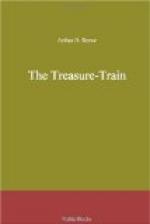“It’s something like that you meant, I presume, when you called it a ‘phantom destroyer’ a moment ago?” asked Kennedy.
MacLeod nodded.
“If you’re interested,” he pursued, hastily, “and feel like going down there to look things over, I think the best place for you to go would be to the Sneddens’. They’re some people who have seen a chance to make a little money out of the boom. Many visitors are now coming and going on business connected with the new works. They have started a boarding-house—or, rather, Mrs. Snedden has. There’s a daughter, too, who seems to be very popular.” Kennedy glanced whimsically at me.
“Well, Walter,” he remarked, tentatively, “entirely aside from the young lady, this ought to make a good story for the Star.”
“Indeed it ought!” I replied, enthusiastically.
“Then you’ll go down to Nitropolis?” queried MacLeod, eagerly. “You can catch a train that will get you there about noon. And the company will pay you well.”
“MacLeod, with the mystery, Miss Snedden, and the remuneration, you are irresistible,” smiled Kennedy.
“Thank you,” returned the detective. “You won’t regret it. I can’t tell you how much relieved I feel to have some one else, and, above all, yourself, on the case. You can get a train in half an hour. I think it would be best for you to go as though you had no connection with me—at least for the present.”
Kennedy agreed, and MacLeod excused himself, promising to be on the train, although not to ride with us, in case we should be the target of too inquisitive eyes.
For a few moments, while our taxicab was coming, Kennedy considered thoughtfully what the company detective had said. By the time the vehicle arrived he had hurriedly packed up some apparatus in two large grips, one of which it fell to my lot to carry.
The trip down to Nitropolis was uninteresting, and we arrived at the little station shortly after noon. MacLeod was on the train, but did not speak to us, and it was perhaps just as well, for the cabmen and others hanging about the station were keenly watching new arrivals, and any one with MacLeod must have attracted attention. We selected or were, rather, selected by one of the cabmen and driven immediately to the Snedden house. Our cover was, as Craig and I had decided, to pose as two newspaper men from New York, that being the easiest way to account for any undue interest we might show in things.
The powder-company’s plant was situated on a large tract of land which was surrounded by a barbed-wire fence, six feet high and constructed in a manner very similar to the fences used in protecting prison-camps in war-times. At various places along the several miles of fence gates were placed, with armed guards. Many other features were suggestive of war-times. One that impressed us most was that each workman had to carry a pass similar, almost, to a passport. This entire fence, we learned, was patrolled day and night by armed guards.




